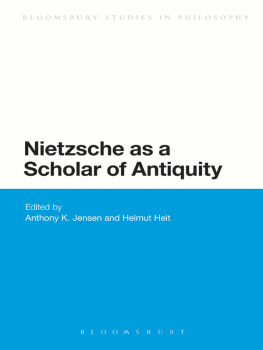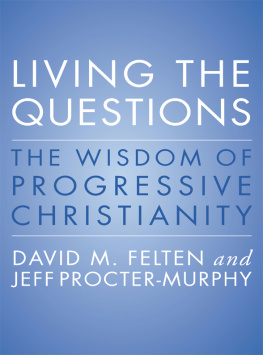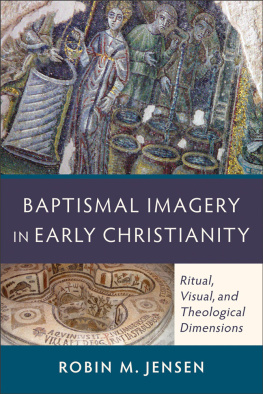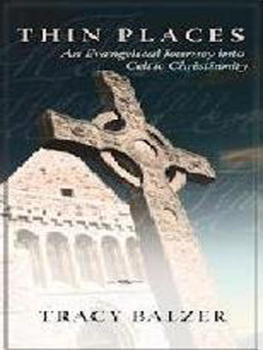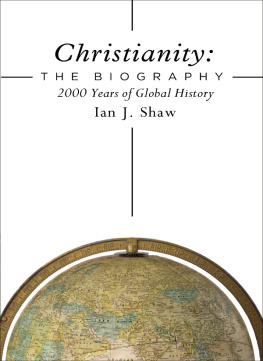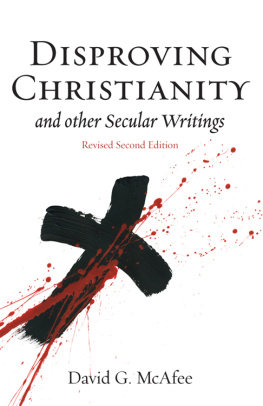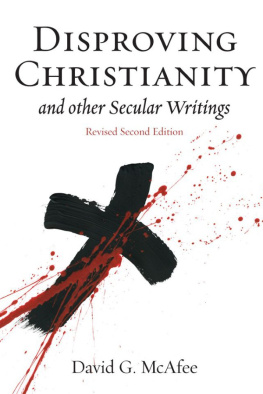Jensen - A False Kind of Christianity: A Conservative Evangelical Refutation of Progressive Christianity
Here you can read online Jensen - A False Kind of Christianity: A Conservative Evangelical Refutation of Progressive Christianity full text of the book (entire story) in english for free. Download pdf and epub, get meaning, cover and reviews about this ebook. year: 2017, publisher: WestBow Press, genre: Religion. Description of the work, (preface) as well as reviews are available. Best literature library LitArk.com created for fans of good reading and offers a wide selection of genres:
Romance novel
Science fiction
Adventure
Detective
Science
History
Home and family
Prose
Art
Politics
Computer
Non-fiction
Religion
Business
Children
Humor
Choose a favorite category and find really read worthwhile books. Enjoy immersion in the world of imagination, feel the emotions of the characters or learn something new for yourself, make an fascinating discovery.

A False Kind of Christianity: A Conservative Evangelical Refutation of Progressive Christianity: summary, description and annotation
We offer to read an annotation, description, summary or preface (depends on what the author of the book "A False Kind of Christianity: A Conservative Evangelical Refutation of Progressive Christianity" wrote himself). If you haven't found the necessary information about the book — write in the comments, we will try to find it.
Jensen: author's other books
Who wrote A False Kind of Christianity: A Conservative Evangelical Refutation of Progressive Christianity? Find out the surname, the name of the author of the book and a list of all author's works by series.
A False Kind of Christianity: A Conservative Evangelical Refutation of Progressive Christianity — read online for free the complete book (whole text) full work
Below is the text of the book, divided by pages. System saving the place of the last page read, allows you to conveniently read the book "A False Kind of Christianity: A Conservative Evangelical Refutation of Progressive Christianity" online for free, without having to search again every time where you left off. Put a bookmark, and you can go to the page where you finished reading at any time.
Font size:
Interval:
Bookmark:
A FALSE KIND
of
CHRISTIANITY
A CONSERVATIVE EVANGELICAL REFUTATION OF PROGRESSIVE CHRISTIANITY
DAN JENSEN

Copyright 2017 Dan Jensen.
All rights reserved. No part of this book may be used or reproduced by any means, graphic, electronic, or mechanical, including photocopying, recording, taping or by any information storage retrieval system without the written permission of the author except in the case of brief quotations embodied in critical articles and reviews.
Scriptures taken from the Holy Bible, New International Version, NIV. Copyright 1973, 1978, 1984, 2011 by Biblica, Inc. Used by permission of Zondervan. All rights reserved worldwide. www.zondervan.com The NIV and New International Version are trademarks registered in the United States Patent and Trademark Office by Biblica, Inc.
This book is a work of non-fiction. Unless otherwise noted, the author and the publisher make no explicit guarantees as to the accuracy of the information contained in this book and in some cases, names of people and places have been altered to protect their privacy.
WestBow Press
A Division of Thomas Nelson & Zondervan
1663 Liberty Drive
Bloomington, IN 47403
www.westbowpress.com
1 (866) 928-1240
Because of the dynamic nature of the Internet, any web addresses or links contained in this book may have changed since publication and may no longer be valid. The views expressed in this work are solely those of the author and do not necessarily reflect the views of the publisher, and the publisher hereby disclaims any responsibility for them.
Any people depicted in stock imagery provided by Thinkstock are models, and such images are being used for illustrative purposes only.
Certain stock imagery Thinkstock.
ISBN: 978-1-5127-8515-9 (sc)
ISBN: 978-1-5127-8514-2 (hc)
ISBN: 978-1-5127-8513-5 (e)
Library of Congress Control Number: 2017906739
WestBow Press rev. date: 07/18/2017
To all the genuine-article women of valor out t here,
Who would never truly question Gods word.
I have labored in the kingdom next to many of them,
Your service is so greatly appreci ated.
The salvation of the multitude is to be preferred to the peace of any individuals whatsoever. Consequently, when certain ones, by their perverseness, hinder the salvation of the multitude, the preacher and the teacher should not fear to offend those men, in order that he may insure the salvation of the multi tude.
St. Thomas Aquinas
Contents
B efore saying anything, I want to address the email address that I have set up specifically for this book. I will be referring readers to it throughout this work. It is ).
This work will be a scathing attack on progressive Christianity (PC from here out). will find the tone of this work very off-putting. But I ask the reader to put aside the pc glasses for the time being and look with me into what the Bible truly has to say about false teaching and the teachers who peddle aberrant doctrines. We will see that, if anything, I am probably being too mild, and certainly the vast majority of the church is far too mild when it comes to heresy. We will see that from beginning to end the Bible is replete with passages addressing the severity with which we are to reproach false prophets and false teachers and that it is the responsibility of the church as a whole, but especially of her leaders, to expose, refute, and deal with these false prophets and false teachers.
It is in that spirit that I write this work. I do not hate those mired in the PC movement; I sincerely do not. I love them enough to tell them the truth. I know that they, and many others, will say that what I just said is so clich and no one buys that kind of talk anymore. But it is not clich. It may be out of style, but it is still the truth and worth saying despite its simplicity and possible overuse. I have no problem hanging out with those who espouse false doctrine (even though I often get the very strong feeling that this sentiment is not reciprocated, especially by PC defenders). I love PC adherents as people and genuinely feel horrible about the future that awaits them if they do not repent. I hate PC; I do not hate in any way, shape, or form progressive Christians.
Next, I want to make it clear that this work is not intended as a scholarly treatise against PC. While such a project would certainly be worthwhile, it is not what I feel called to write at this time. The target audience of this work is the laity within CE, as well as non-scholarly ministry leaders, including pastors, within CE who do not feel called to engage in a great deal of abstract, extremely in-depth theology, but understand the need to be abreast of the key aspects of our faith. It is my hope that many others will read this work as well, but my target audience is the one just specified. It should also be borne in mind that, because of this fact, the prose of this work will have a far more casual and colloquial feel than many might expect. The work will be substantive at every point, but again, it will not be technical. On this note, I would ask the reader to be especially aware of the way in which I use the word we. I will be using it very casually throughout to mean me and the readers, or me and all CE thinkers, etc., depending on the context. I will not be using it in the formal academic sense and certainly never in the sense of the royal we (yuck!).
As far as what constitutes the theology of CE, I will be working under the framework that all groups that adhere to classical Protestant theology fall under the umbrella of CE, and this would include conservative Lutherans, conservative Reformed (not to be strictly equated with Reformed theology, I am here referring to the denominations and churches that officially go by that label, sometimes referred to as the Continental Reformed), conservative Anglicans and Episcopalians, conservative Presbyterians, conservative Congregationalists, conservative Baptists, conservative Methodists and Wesleyans (including orthodox members of the Holiness movement), orthodox Pentecostals, orthodox Independent Bible churches, and orthodox Charismatics. I believe that many Roman Catholic, Eastern Orthodox, Seventh-day Adventist, Christian fundamentalist, Christian restorationist (under this label I am only referring to the Stone-Campbell movement and not the many other groups that are often somewhat erroneously included under this title), and Christian Brethren individuals and churches who do not fully understand or hold to all that their group teaches can also be considered part of CE. But I do not believe that those groups as groups are part of CE. I also believe that there are a few (although I would say very few) people in religions other than the ones just mentioned that are indeed saved but are so woefully confused and misinformed that they remain for a time in religions that are terribly removed from true biblical Christianity. Having said that, the Bible is clear that God primarily works through the institutional church and, therefore, the vast majority of the children of God on earth today are part of CE.
As I wrap up the preface, allow me to present my thoughts on my own interaction with PC. I have been heavily interacting with PC folks, both on the Internet and in person, for the past few years. In that time, I have consistently found that the vast majority of those within this movement are some of the most arrogant, elitist, dogmatic, absolutist, narrow-minded, stubborn, illogical, emotive, and hypocritical people that I have ever come across. I know how mean that probably sounds on some level, but that has been my honest experience. There is no question that many will say that I am only saying this because they are my theological opponents and because I am writing this work. But I cannot be more emphatic when I say that this is not the case. I have had the privilege of living and working in some of the most diverse places in the world. I have friends and family from almost all walks of life. I have been close with black people, Mexican people, Asian people, Polynesian people, rich people, middle-class people, poor people, law-abiding citizens, criminals, straight people, gay people, Muslims, Buddhists, Catholics, Mormons, liberals, conservatives, and I could go on. For the most part, I have found the vast majority of the people I have been close with from all of these different pockets of humanity to be very good people that I get along with easily. Yes, we have our very strong disagreements, but usually it does not create invective.
Next pageFont size:
Interval:
Bookmark:
Similar books «A False Kind of Christianity: A Conservative Evangelical Refutation of Progressive Christianity»
Look at similar books to A False Kind of Christianity: A Conservative Evangelical Refutation of Progressive Christianity. We have selected literature similar in name and meaning in the hope of providing readers with more options to find new, interesting, not yet read works.
Discussion, reviews of the book A False Kind of Christianity: A Conservative Evangelical Refutation of Progressive Christianity and just readers' own opinions. Leave your comments, write what you think about the work, its meaning or the main characters. Specify what exactly you liked and what you didn't like, and why you think so.


